
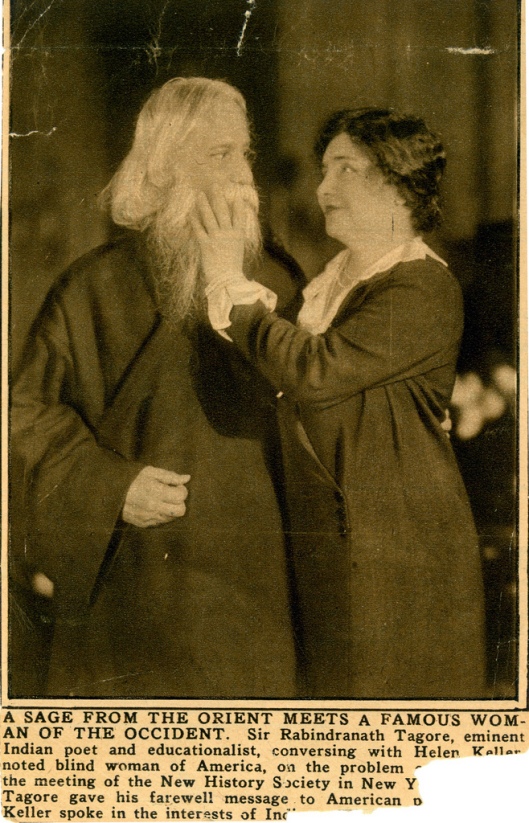 I have been meditating on a non existent natural blue rose
I have been meditating on a non existent natural blue roseIt doesn’t exist because it would be hard to see against the preponderantly green leaves of nature. This hasn’t stopped gardeners from trying to breed a blue rose. There is the genetically modified blue carnation. True, there is the blue Gentin with pointers visibleto bees in ultraviolet light,
Gardeners have spread flowers across the continents designing their land for painterly effect of colour, texture and composition. In nature, flowers are purely sexual: reproducing, competing and spreading their seed. Bees see more red and butterflies red and yellow and honeyeater[1] birds want dripping nectar, often in deep tubes, on strong stems. Night flyers are attracted to pale strongly scented flowers. The lemon scented jasmine dead looking by day comes alive at night. Pygmy or honey possums may forage from the strong stemmed gravillea. Millions of pollen grains are needed when cast randomly to the wind.
How does this relate to meditation?
What appears beautiful to us is not what the bee or butterfly sees. There is more to a flower than meets the eye. There is more yo be observed than our common sensory input reveals.We have all heard of blind people gifted with increased hearing or sense of touch. Some meditations help us reduce our sensory distractions.
But what if we had no choice? Then I remembered Helen Keller and a story told by Osho.
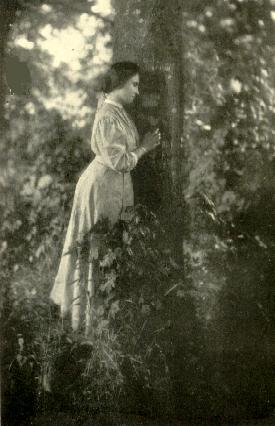 I read Helen Keller (1880 – 1968) in high School and was struck by her beautiful descriptions of nature[2].
From “the anguish and horror … bowed down by the twofold weight of
blindness and deafness,” Helen became a highly cultured mystic in the
Hermetic-Platonic tradition.
I read Helen Keller (1880 – 1968) in high School and was struck by her beautiful descriptions of nature[2].
From “the anguish and horror … bowed down by the twofold weight of
blindness and deafness,” Helen became a highly cultured mystic in the
Hermetic-Platonic tradition.At age nineteen months, Helen was diagnosed with “acute congestion of the stomach and brain” and left her blind and deaf from high fever.
“A Phantom in a No-World” is how she later described her five years of complete isolation. “Like a ship in a dense fog, groping its way without compass or sounding-line’, she lived in ‘a conscious time of nothingness. I did not know that I knew aught or that I lived or acted. I had neither will nor intellect. . . I had no power of thought.”
Most of us think with pictures and words. Asked not to think of s pink elephant, we do.
Dr. Alexander Graham Bell, inventor of the telephone, was a former teacher of the deaf, whose eife couldnot hear. He encouraged the Keller to the Perkins Institution for the Blind, who recommended a half-blind twenty-one year old Irish woman named Annie Sullivan.
They first met on March 3, 1887.
“My teacher, Anne Mansfield Sullivan, had been with me nearly a month, and she had taught me the names of a number of objects. She put them into my hand, spelled their names on her fingers and helped me to form the letters; but I had not the faintest idea what I was doing. I do not know what I thought. I have only a tactile memory of my fingers going through those motions and changing from one position to another.
“One day she handed me a cup and spelled the word. Then she poured some liquid into the cup and formed the letters w-a-t-e-r. She says I looked puzzled and persisted in confusing the two words, spelling cup for water and water for cup. Finally I became angry because Miss Sullivan kept repeating the words over and over again.
“In despair she led me out to the ivy-covered pumphouse and made me hold the cup under the spout while she pumped. With her other hand she spelled w-a-t-e-r emphatically. I stood still, my whole body’s attention fixed on the motions of her fingers as the cool stream flowed over my hand. All at once there was a strange stir within me–a misty consciousness, a sense of something remembered. It was as if I had come back to life after being dead!”
“I was like an unconscious clod of earth. There was nothing in me except the instinct to eat and drink and sleep. My days were a blank without past, present, or future, without hope or anticipation, without interest or joy.”More than merely physical–that it was an awakening to mental realms.
“Now I see it was my mental awakening. I think it was an experience somewhat in the nature of a revelation. I showed immediately in many ways that a great change had taken place in me. I wanted to learn the name of every object I touched, and before night I had mastered thirty words. Nothingness was blotted out! I felt joyous, strong, equal to my limitations! Delicious sensations rippled through me, and sweet, strange things that were locked up in my heart began to sing.”
“When the sun of consciousness first shone upon me, behold a miracle! The stock of my young life that had perished, now steeped in the waters of knowledge, grew again, budded again, was sweet again with the blossoms of childhood. Down in the depths of my being I cried, “It is good to be alive!” I held out two trembling hands to life, and in vain would silence impose dumbness upon me henceforth.
“That first revelation was worth all those years I had spent in dark, soundless imprisonment. That word “water” dropped into my mind like the sun in a frozen winter world.
“The world to which I awoke was still mysterious; but there were hope and love and God in it, and nothing else mattered. Is it not possible that our entrance into heaven may be like this experience of mine?”Few will ever experience as deep a life affirming self realisation. Without preconceived notions, Helen could experience a break through to meaning mediated through touch and smell. Her regeneration from a living death to humanity, grasping what religious sages describe as a change from “death” to life.
What lesson can we learn from this story?
With only touch and smell, Helen learned about new-born life when Annie had her hold an egg in her hand so that she could feel the baby chick ‘chip-chipping’ its way out through the shell.Of her teacher, Helen wrote:
“Poetry and music were her allies. In her fingers words rang, rippled, danced, buzzed, and hummed. She made every word vibrant to my mind–she would not let the silence about me be silent. She kept in my thought the perceptive, audible, and other qualities of every object I could touch. She brought me into sensory contact with everything we could reach or feel–sunlit summer calm, the quivering of soap bubbles in the light, the songs of birds, the fury of storms, the noises of insects, the murmur of trees, voices loved or disliked, familiar fireside vibrations, the rustling of silk, the creaking of a door, and the blood pulsing in my veins.”We are told our brain makes neural connections. relationship between the human sensorium and the power of the human mind Similarly, Helens new life seems to me made by her ability to make connections through touch and smell to form meaning with her outer environment. In some esoteric traditions the senses are similarly mixed: the Jews “saw the voices” from Mount Sinai, the famous Rabbi Akiva claims the experience. A more secular suggests we created god from multiple and mixed senses, while mediators may believe increased perception is a divine gateway.
When asked how she taught Helen abstract ideas like gladness, goodness, love, and beauty, Annie Sullivan replied “It isn’t the word,but the capacity to experience the sensation that counts. The word love she learned as other children do, — by its association with caresses.”
As Helen herself said:
“My fingers cannot, of course, get the impression of a large whole at a glance; but I feel the parts and my mind puts them together. I move around my house, touching object after object in order, before I can form an idea of the entire house… It is not a complete conception, but a collection of object-impressions which, as they come to me, are disconnected and isolated. But my mind is full of associations, sensations, theories, and with them it constructs the house. The process reminds me of the building of Solomon’s temple, where was neither saw, nor hammer, nor any tool heard while the stones were being laid one upon the other.”
“Touch cannot bridge distance,-it is fit only for the contact of surfaces,-but thought leaps the chasm. For this reason I am able to use words descriptive of objects distant from my senses. I have felt the rondure of the infant’s tender form. I can apply this perception to the landscape and to the far-off hills.”Smell is, for her, “the fallen angel” of the senses:
“Touch sensations are permanent and definite. Odors deviate and are fugitive, changing in their shades, degrees, and location. There is something else in odor which gives me a sense of distance. I should call it horizon–the line where odor and fancy meet at the farthest limit of scent. Smell gives me more idea than touch or taste of the manner in which sight and hearing probably discharge their functions. Touch seems to reside in the object touched, because there us a contact of surfaces. In smell there is no notion of relievo, and odor seems to reside not in the object smelt, but in the organ. Since I smell a tree at a distance, it is comprehensible to me that a person sees it without touching it.”So Helen learned to “listen’ to a tree. And to imagine beauty as a form of goodness.
Rather intriguingly a Dr Tilney tested her sensitivity, and found her not any more sensitive than the average human. When spun on a chair she could only tell by the feeling of air on her face.
“The great difference exists in her use of the senses by the development of her brain” he concluded, long before we could test for neuro-plasticity. We are left with ambiguous speculations.
“I understand how scarlet can differ from crimson because I know that the smell of an orange is not the smell of a grapefruit. I can also conceive that colors have shades, and guess what shades are. In smell and taste, there are varieties not broad enough to be fundamental, so I call them shades.” – Helen KellerAt worst, she was criticised for literary flourish using the word colour in ways that to sighted people would not make sense.
“Philosophy constantly points out the untrustworthiness of the five senses and the important work of reason which corrects the errors of sight and reveals its illusions.”
Helen Kellers life suggests there is more to reality than sense perception. Our mind creates our reality. For positivists to lose part of perception was to lose part of reality is lost.
This has been a perennial philosophic debate.
Gottfried Wilhelm Leibniz suggested “Being, itself, and truth are not known wholly through the senses; for it would not be impossible for a creature to have long and orderly dreams, resembling our life, of such a sort that everything which it thought it perceived through the senses would be but mere appearances. being and of truth is found therefore in the Ego and in the understanding, rather than in the external senses and in perception of external objects.” Or as Max Plank simplified it “As long as we logically pursue the positivist teaching we must exclude every influence of a sentimental, aesthetic, or ethical character from our minds…””
“With Helen, we have a clear case of someone who thought of herself as having instrumentation, from which an image of reality could be gleaned through the mind; through generating a mental picture which can, potentially, be something completely efficient. She implies that her imagination is more actively engaged as a result of lacking the sense of vision. The particular burden of vision, as she describes it, is that the sensing person is less clear of the fact that their mind is forming a picture of reality from impressions of instruments. Reality is not being imparted from the eyes to the mind, which is simply a receptacle. Rather, the mind is always working to construct this picture of reality, and perhaps more so when the impressions are not being perceived at the same time, as with an image which can only be built up over time. At least the primacy of the mind’s role may be more clear to the perceiver in this case. She says that she will not claim who generates a more efficient conception, the seer or the blind, who sees through touch, but as her own writings show clearly, this woman who could not see, had a real sense of the power of her own mind, and an efficient conception of reality, which we know because her thoughts can move us and can generate powerful ideas within our own minds.” – Meghan Rouillard
Yet Helen heard more without sound
“Critics delight to tell us what we cannot do. They assume that blindness and deafness sever us completely from the things which the seeing and the hearing enjoy, and hence they assert we have no moral right to talk about beauty, the skies, mountains, the songs of birds, and colors… Some brave doubters have gone so far even as to deny my existence… I throw upon the doubters the burden of proving my non-existence. When we consider how little has been found out about the mind, is it not amazing that any one should presume to define what one can know or cannot know? I admit that there are innumerable marvels in the visible universe unguessed by me. Likewise, O confident critic, there are a myriad sensations perceived by me of which you do not dream… Certainly the language of the senses is full of contradictions, and my fellows who have five doors to their house are not more surely at home in themselves than I…“
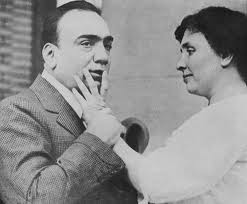 Of
a soprano she said “When I read the lips of a woman whose voice is
soprano, I note a low tone or a glad tone in the midst of a high,
flowing voice.” When she ‘heard’ Enrico Caruso she was moved to tears.
Of
a soprano she said “When I read the lips of a woman whose voice is
soprano, I note a low tone or a glad tone in the midst of a high,
flowing voice.” When she ‘heard’ Enrico Caruso she was moved to tears.Sound uses our entire body as a resonator, feeling the touch of a singers powerful voice is not impossible.. Lyndon LaRouche suggested she had a kind of sixth sense which perceives other characteristics beyond the sound of classical music, or helps us know we are part of the human species even if we are blind and deaf.
If her gift cannot be explained by senses or supersenses, as Dr. Tilney concluded, then didthe higher power of language help her grasp ideas which bridge single sense impressions and develop them?
Annie Sullivan insisted Helen use complete sentences.
For example, Helen learned the word to think when her teacher Anne Sullivan wrote on her head while she was beading a necklace. But in later in life she could use the word in different contexts.
“I cannot always distinguish my own thoughts from those I read, because what I read becomes the very substance and texture of my mind,” or,
“Just as the wonder-working mantle of the Nautilus changes the material it absorbs from the water and makes it a part of itself, so the bits and pieces of knowledge one gathers undergo a similar change and become pearls of thought,” or, “Greek is the loveliest language that I know anything about. If it is true that the violin is the most perfect of musical instruments, then Greek is the violin of human thought.”While we may never know how Helen Keller constructed her thought world, she prove to us the power of the mind to create a reality.
“Whoso would be a man must be a nonconformist” wrote Emerson. I suggest it is was true for the Helen Keller.
Given a a copy of Emanuel Swedenborg’s Heaven and Hell in raised letters, Helen found in it “a likeness of a God as lovable as the one in my heart.”The same philosopher had informed Abraham Lincoln.“Its spirituality and idealism appeal to me. It also fosters all kinds of true freedom, places humanity above party, country, race, and it never loses sight of the essence of Jesus’s gospel – the supreme and equal worth of each individual soul. That doctrine is the heart of Christianity.”While lapsed Catholic Annie Sullivan differed she said “I can respect your beliefs because you do not use them like a weakling to console yourself for blindness and deafness, but as part of the happiness God wants to create for us all.”
Her advise was “form your views independently. Only keep yourself clear of competitive sects and creeds, and do not get involved in any fanaticism. Always be just and generous to those with whom you differ.”
On another occasion “What we learn from others is of less value than what we teach ourselves!”
She was also a member of the first Humanist Society in America along with Einstein. But It seems that her family were unimpressed by her beliefs and as a young passionate woman her only known suitor was forced away by her mother.
However, was vocal in her opinions, speaking along with Rabindranath Tagore at the New History Society in New York, founded in 1929 to further the Bahai Faith, in the interests of India.”

Rights: Samuel P. Hayes Research Library, Perkins School for the Blind, Watertown, MA
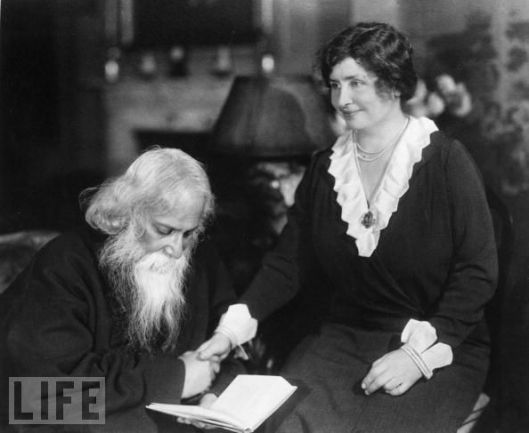
There is a deeper Helen than the legend of a miracle child.
“Most people know of Helen Keller as a disabled seven year old in the grips of an oblivion of no sight, no sound, rescued by an incredible teacher at a well at the age of seven, brought out of that oblivion through language …and then it disappears from people’s minds.” (Bergmann, 1999, Interview transcript, The Real Helen Keller, Channel FourTelevision).As depicted in Anne Pughs documentary, The Real Helen Keller for more than forty years after her death, Helen Keller is still known internationally as the little deaf-blind girl, the “miracle child” who triumphed over adversity. It is an image that endures through the Hollywood film “The Miracle Worker” – but Keller never chose that image, and she battled against it all her life. Hidden from the public gaze was the real Helen Keller, a flesh-and-blood woman, writer and radical activist, suffragette and socialist.
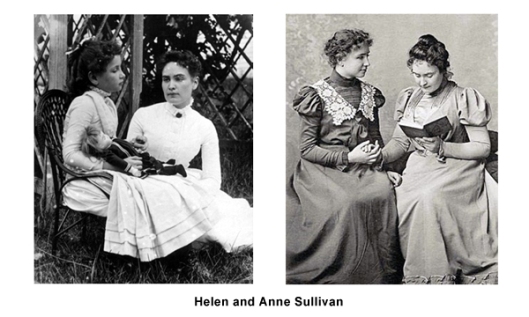 Nor do they remember that her teacher of 50 years Annie Sullivan was also disabled. Their relationship was mutually supportive.
Nor do they remember that her teacher of 50 years Annie Sullivan was also disabled. Their relationship was mutually supportive.“It’s ironic, isn’t it, that Annie Sullivan was a person with a disability herself, but is never really remembered that way and when her disability is noted, it’s minimised. It’s reduced to insignificance, she has a little eye trouble, she wears kind of designer sun glasses in The Miracle Worker. But we don’t think of this as in fact two disabled people mutually supporting one another, we think of it as dependent and professional.” (Longmore, 1999) …
“Throughout her life, the validity of her academic and political achievements were questioned by many. She never fully escaped suspicion that she was really the puppet of Annie Sullivan, “speaking and writing lines that are fed to her by Annie’s genius” (Lash, 1980). Deviations from the image, including her political beliefs, were blamed on Annie, even though Helen’s commitment to socialism preceded and exceeded Annie’s. It was partly in answer to these accusations that Helen worked for years to improve the clarity of her speech: if she could speak directly to her critics, instead of through Annie, her only interpreter, then perhaps they would be convinced that her words were her own.”
– Liz Crow Helen Keller: Rethinking the Problematic Icon
There is always more to the rehashed tales of collective memory.
Like gardeners selecting flowers for painterly effect, we like to choose the colours and hues we see of people. We also live colours and hues imposed on us, not of our inner nature.Then there are those like Helen Keller who live a life true to their nature.
Energy healer Caroline Myss is claimed to have observed that Helen Keller “was a mystic and was able to hold her hand over a flower and tell you the type of flower it was, and the personality of the flower…..She was able to remember the vibration of every person she met forever, she would simply know who you were and who you are just when you walked into a room and she hasn’t seen you in twenty years.”
This again leads me back to the non existent blue rose. I came to India with a useful reality that no longer worked in my new world. I have also had to reconect my linear singular thinking to a collective and inductive India. It is no where as a comprehensive change as experienced by Helen. She has shown what perseverance can do.
…and What did Helen Keller learn from Nature?
“According to all art, all nature, all coherent human thought, we know that order, proportion, form, are essential elements of beauty. Now order, proportion, and form, are palpable to the touch. But beauty and rhythm are deeper than sense. They are like love and faith. They spring out of a spiritual process only slightly dependent upon sensations. Order, proportion, form, cannot generate in the mind the abstract idea of beauty, unless there is already a soul intelligence to breathe life into the elements.
“Many persons, having perfect eyes, are blind in their perceptions. Many persons, having perfect ears, are emotionally deaf. Yet these are the very ones who dare to set limits to the vision of those who, lacking a sense or two, have will, soul, passion, imagination.
Faith is a mockery if it teaches us not that we may construct a world unspeakably more complete and beautiful than the material world. And I, too, may construct my better world, for I am a child of God, an inheritor of a fragment of the Mind that created all worlds.”
That truth remains independent of our culture or religion.
[1] Of 151 species world over, 73 are found in my native Australia.[2] For this article I source most detail from Norman D Livergood’s Hellen Keller as Mystic and Helen Keller: Mind over Instrumentation by Meghan Rouillard.
>Reflections on a non existent blue rose on a tangent to Helen Keller<<
Helen Keller. Blue Rose. Life past-present-future when THUGS are the hired guns of America, called the "CRIMINAL JUSTICE SYSTEM" and then the LAW ENFORCER OF THE LAW, IE EG SHERIFFS, the POLICE ARE IN OUR WORST IMAGINATIONS. THUGGERY KILLERS.
GOVERNMENT?!
Government that gets paid digital fraud to destroy the U.S. Constitution's BODY OF LIBERTIES. Dead the Body of Liberties, died when the decision got made to make America a non-sovereign nation, money stolen via the Federal Reserve System 'Fed' THUGGS.
AMERICA DIED. NOW REBIRTH, OR NOT?
BLUE ROSE IDEA: BODY OF LIBERTIES RESURRECTED INTO LIFE AGAIN IN THE "LAND OF THE FREE" !
Blindness is an energy, and all energy is energy in essence.
The frequency of blindness for Helen Keller was a contract to understand the whole universe of energy.
We're there, too, USA is blind as can be and dead and can indeed be Helen Keller, the spirit that is, too, FAITH.
USA MEDITATE AND ENERGIZE THE BLUE ROSE FULL RECOVERY, IN OUR IQ AND EQ, PERFECT EYES, PERFECT EARS, FAITH ~~
.. to be continued ...?]
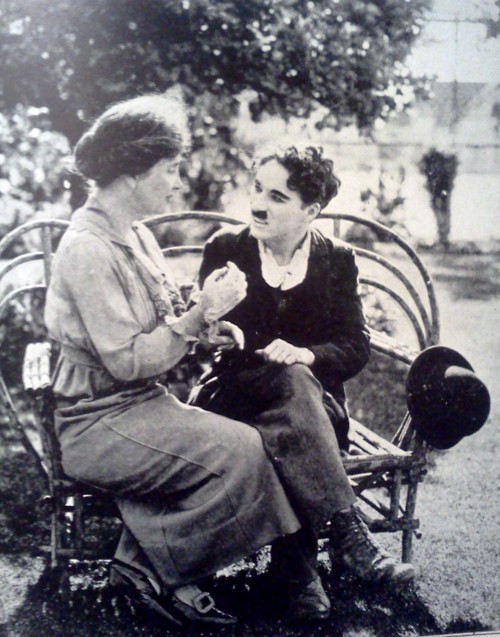
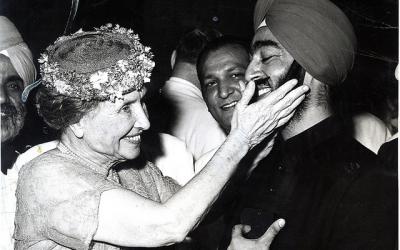
No comments:
Post a Comment